QuestionQUESTION: about 5 weeks ago, while I was asleep, my heat lamp for my leopard gecko burned out and I didn't notice it until late the next morning. I was mid winter and was very cold. "spot" was on top of the rock that he usually sleeps in, and was not very responsive. I replaced bulb ASAP and he eventually moved about but wasn't eating. He seems to drink water (or it evaporates - but I have seen the sand in his dish which makes me think he has been in it. ) He finally ate one meal worm 2 days ago but that is all he has eaten in about 5-6 weeks. His tail is still fat and he doesn't seem to have lost any weight. Is he okay? How long does hibernation last? He seems to perk up when I come near the cage and seems to respond to my voice. Should I pick him up or leave him alone?
I just want the best for him!
Any help would be appreciated!
Suzanne
ANSWER: You need to take this gecko to the vet. If it was improperly allowed to hibernate without being fasted first, because it did not have adequate habitat temps, then waste in its bowels could cause sepsis: which will be fatal, whether his tail is still fat or not. 5-6 weeks is too long to go without food if you did not intentionally hibernate this animal, or know what you were doing in "hibernating" it/allowing it to go without heat.
His temps also need to be returned to where they should be, and mealworms are one of the worst things you could use for food, especially a potentially sick gecko. Mealworms are just cheap fatty filler...filled with sodium, phosphorous, and chitin. Feeding mealworms after a long period of quasi-hibernation and probable dehydration is the wrong thing to do. You are asking for an impaction as well.
Take it to a vet!
http://www.drgecko.com
---------- FOLLOW-UP ----------
QUESTION: I Will! The reptile person at Peco said it was ok if he did not eat as long as he still drank and was fat. She also said not to put any crickets in there if he wasn't eating as they would eat him or make him sick. She also said this about the meal worms. So if he doesn't eat them I take them out. I did not know the mealworm were bad for him but that is what everyone told me to feed him! i AM SO MAD RIGHT NOW! Not at you, but at what I have been hearing.
He has NEVER ate that much. The lady at Petco told me to feed him 5 meal worm a day and 1-2 crickets, but we have had him for about 3-4 years and he has never ate that much. Maybe 3 meal worms every 3-4 days and a couple crickets a week. Also his cage temp has been about 70 - 80 degrees all his life. Maybe more in summer months. He is active and when I come up to cage, he seems to come towards me and climb up side of tank like he wants to come out.
I will take him to the Vet as soon as I get my taxes back which should be in about one week. I have been on disability for 6 months and will do ASAP. I love him and do not want to make hime suffer.
Anything else I can do for now and I do not know where you are located but I am in Napa, CA and if you know of any reptile vets in or around the area, I would take him there.
Thanks for your help
Suzanne
AnswerI just wanted to note here about the UVB, a warning to stay away from the repti glo 10, or any compact/coil fluorescent, as numerous harmful UV radiation cases have been reported with them.
OK, I am going to give you some more info to try to help in the meantime. I merely saw this question sitting in the "pool" unanswered, which means the original person you addressed it to did not feel they could answer for some reason. Initially I was just trying to clear the boards and throw some quick answers out there for people who were waiting.....
Sorry, but my wife works at petco. The truth is you can't trust anything people at pet stores tell you. They are there to sell stuff and most of them have little or no real reptile experience themselves. Many so-called "specialists" don't keep any reptiles at home themselves at all. Word of advice...never trust anything someone tells you unless they have 8-10 years or more of reptile keeping experience. I have more than 20 years experience with reptiles of many species, and I am a recognized reptile rescuer. I am constantly correcting the employees at my wife's petco location about the reptiles. Their reptile specialists don't know jack, and I have seen their training material which has much incorrect information printed right in it. I'm all over them all the time, and they hate it...but I'm there to help the animals.
It is true, that you never leave live food in the tank with him if he is not eating at the time. Mealworms won't bother them so much, but crickets will chew on a reptile and cause an open wound which can get infected. Mealworms are ok occasionally as a treat, but I advise only smaller ones, never large, and they should never be used for a reptile which has been sick, recently hibernating, dehydrated, or has not eaten in some time. They are not good on digestion, besides the fact that they are not nutritious. Use smaller crickets too for much the same reason if you want a healthy gecko. Large crickets have harder exoskeletons which can cause bowel inflammation and possible impaction. Rule of thumb is: prey should be no more than 1/2 the width and length of the lizard's head. Adult geckos can be fed every 2-3 days if they are eating sufficiently when they are fed.
For an adult gecko, it should be more like 5 or 6 crickets per feeding ( depending on specific size of cricket ( 1/2" ), more if using small crickets [ 1/4" or smaller ] ), and 1-2 small to medium mealworms, if any. She is completely wrong, and someone should correct her on that. Mealworms are purely fatty foods, and that is not good as all the time food for a healthy animal, much less one that is sick or weak.
If you have had him several years, then he may have some issues such as genetic or metabolic disorder causing him complications, but you may also have some things wrong with the environment, or he may be stressed, as the reason he does not eat much. I recommend giving him some warm water soaks, and them keep a shallow bowl of water for him available in his tank. Next, get him an undertank heater or ceramic heat emitter to warm the substrate and environment. Along with his normal day lighting, this should raise temps to nearer the mid 90s during the day. At night keep it closer to the low-mid 80s. Get a thermometer to put right down on the sand so you can tell how hot the substrate is. I just use little mercury outdoor thermometers that I get from Wal-Mart for $1.
Now, most people are going to tell you that Leopard Geckos don't need UVB lighting, but I highly disagree. Leopard Geckos, though being nocturnal, nevertheless, do live on this planet during the day, and they live in desert regions of Pakistan, Afghanistan, Iran, etc. They do get exposed to UVB scatter from sunlight in these regions during the day as they are in their dens, burrows, or rock crevices. In the wild, they are exposed to UVB during the day. Thus, I recommend to all nocturnal gecko owners that they at least keep a UVB fluorescent tube light overhead ( Repti-Glo 5.0-8.0 ) and on for several hours a day. Many gecko breeders are beginning to realize some complications in not allowing UVB lighting for their geckos.
Do what you can to correct these things. If you can't get a UVB light right now, then put the gecko's tank near a sunny window for some time during the day..SO LONG AS IT DOES NOT GET TOO HOT FOR HIM-monitor temps to make sure they do not go above the mid 90s, as heat will creep up in a tank to some degree. He also needs a cave to hide in if not already.
See if there is any improvement in responsiveness or appetite with some UVB exposure and slightly increased temperatures, along with plenty of water and occasional warm water soaks. Also-use only filtered/dechlorinated/treated water. No straight tap water. Make sure he is going to the bathroom. There should be fecal matter every few days at least, along with a yellowish-white uric acid crystal ( urates ). Little to no urates indicates possible dehydration or kidney failure, as does darker yellowish brown crystals, which can also indicate infection. As long as he is passing normal colored urates and fecal matter, then this is good news.
Also, try to find and purchase some Bene-Bac bird and reptile pro-biotic, in powder form. If your local pet stores ( usually smaller independent shops or specialty reptile and bird shops ) do not stock it, then try online. Dust the geckos food with some of this Bene-Bac powder to help boost immunity and appetite by bringing up his normal gut flora. They also manufacture a gel form, and though you can use this, it is much messier to administer and dirt usually sticks to the gel. You may also temporarily use a product called "Jump Start". This is basically a temporary high calorie glucose supplement to boost blood sugar and up the animals activity and appetite for short enough periods to promote some normal feeding and other behavior.
If no improvement very soon, then he should go to the vet. If so, then an x-ray to search for impactions or foreign bodies in the bowels may be in order, as well as a fecal exam for parasites, and a bacteria culture. A small amount of blood may be drawn to gram stain and check for sepsis also. As I said, any food matter in an animals bowels when it goes dormant will decompose and allow proliferation of harmful bacteria, which will make the animal ill. That is why they should be fasted and bowels clear before hibernating. Keep the most recent fecal samples just before taking to the vet, in a double bagged ziplock. Panacur orally may be used to treat for possible gastric parasites, and is safe.
Note: No Ivermectin dewormer, vitamin A shots, or Baytril by injection. If the vet does not understand why, then find another vet with more reptile experience. I recommend against using antibiotics in knee jerk fashion without actually doing a culture or gram stain to check for infection, but if the vet wishes to prescribe an antibiotic, and wants to use Baytril, the I recommmend orally only. Injection can result in pain and tissue damage.
My wife has a mated pair of Leopard Geckos that are more than 10 years old now.
Here is a list of reptile vets from anapsid.org:
http://www.anapsid.org/vets/califn.html
You may also contact me through my rescue at: http://freewebs.com/wichitafallsreptilerescue

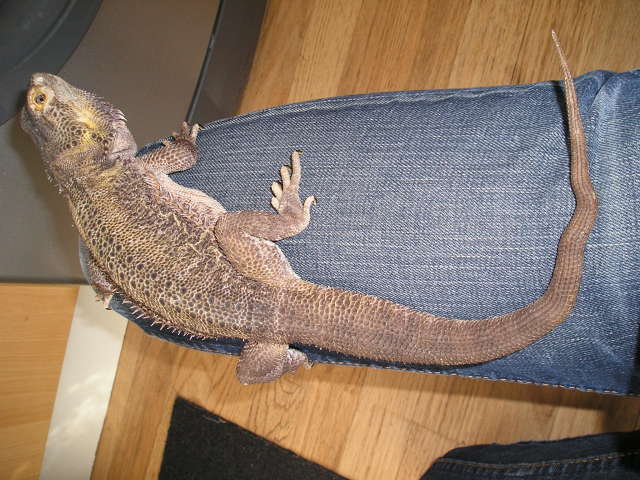 kink,bend or break in tail
QuestionQUESTION: hi i have a bearded dragon he/she is
kink,bend or break in tail
QuestionQUESTION: hi i have a bearded dragon he/she is
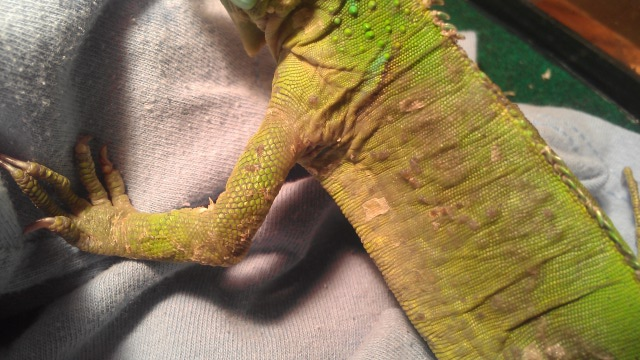 Black and red blisters/bumps on my iguana
Question
black bumps under his belly
hello
Black and red blisters/bumps on my iguana
Question
black bumps under his belly
hello
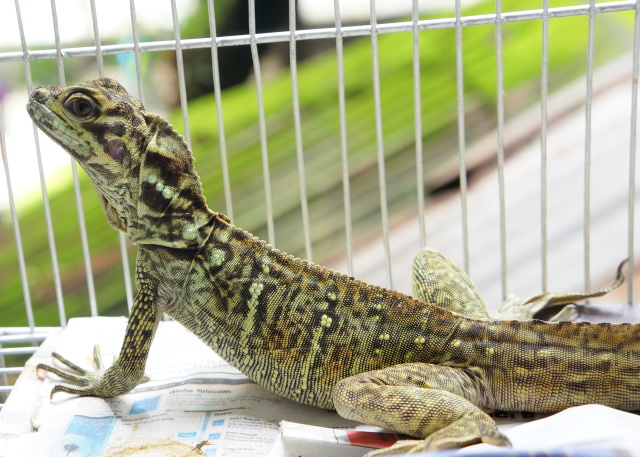 Identifying Sailfin lizard species
QuestionQUESTION: Hello Tracie, Ive been keeping a juve
Identifying Sailfin lizard species
QuestionQUESTION: Hello Tracie, Ive been keeping a juve
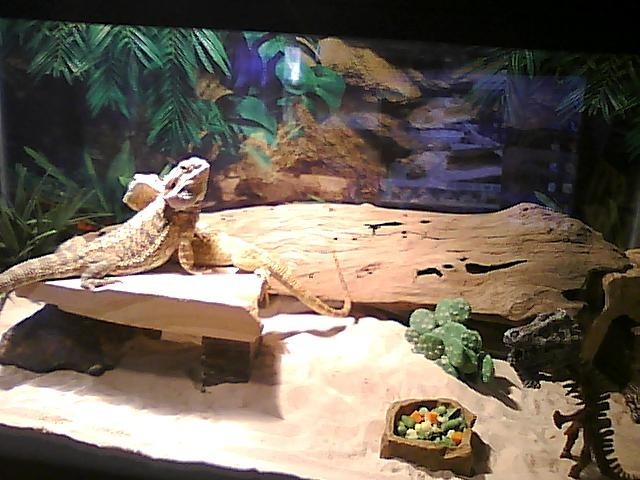 Please read
QuestionQUESTION: How are you Tracie.Im Antone and have
Please read
QuestionQUESTION: How are you Tracie.Im Antone and have
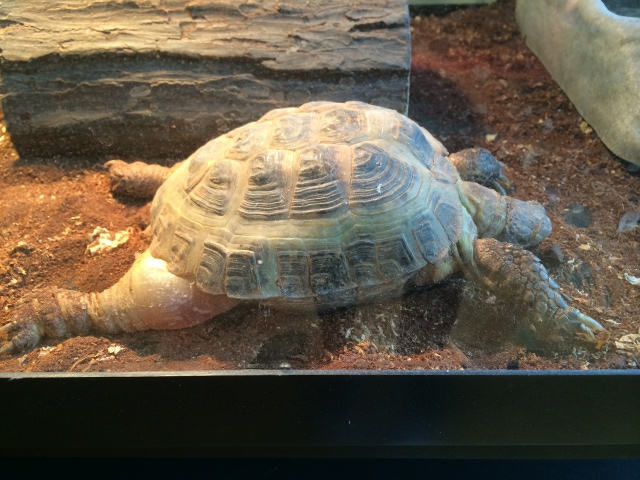 My tortoise
Question
Tortoise
My tortoises back legs have be
My tortoise
Question
Tortoise
My tortoises back legs have be